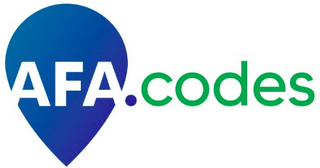Documentation AFA.codes

AFA Codes (formerly OSMcodes) is a project of the Instituto AddressForAll aimed at implementing and improving the geocoding system of the Discrete National Grid Systems - DNGS standard. AFA Codes strive for maximum quality: highly compact, user-friendly, multi-purpose, and computationally efficient.
Main features:
- Homepage - location selection at http://afa.codes
- Interface (example in BR-SP-Campinas) at http://afa.codes/BR-SP-Campinas
- Repositories at https://git.afa.codes (see also API list, Issues and Version)
- Separation of topics: DNGS standard (public) vs AFA implementation of the standard (potentially private).
- Endpoints for Cameroon documented with Swagger, http://dev.api.banoc.coeurduweb.com/docs/
Sections
Main documentation sections in this wiki:
- Template:Ns-xref: for contracts and description
- Template:Ns-xref: Official guide to the AFA Codes API.
- Template:Ns-xref: explains to laypeople what we do
- Template:Ns-xref: describes the project, its products, and services.
- Template:Ns-xref: establishes conventions and methodologies for this project.
- Template:Ns-xref: describes and classifies various applications and ways to use the solution.
- Template:Ns-xref: Frequently Asked Questions.
- Template:Ns-xref: git repositories containing source code.
- Template:Ns-xref: test script and execution for
AFA.codesquery pages. - Template:Ns-xref: data visualization module and command interface.
- afac:Viz/Navigation: reference manual on the map and geocode navigation interface.
- Template:Ns-xref: quick, usage, and installation guides.
- Template:Ns-xref: credits, licenses, and other attribution information.
- Template:Ns-xref: versions of the software used in production.
- Countries with
AFA.codesimplemented, regardless of the domain:- Template:Ns-xref - Germany
- Template:Ns-xref - Brazil;
- Template:Ns-xref - Colombia.
- Template:Ns-xref - Cameroon.
- Template:Ns-xref - El Salvador.
- Template:Ns-xref - Ecuador.
- Template:Ns-xref - India.
- Template:Ns-xref - Uruguay.
- ... - Pending creation of automation for the methodology, https://gis.stackexchange.com/a/489059/7505
- Other functions implemented in the domain:
Key Points
- AFA Codes is a geocoding system where each rectangle of the national territory, from 1 km² to 1 m², receives the shortest possible alphanumeric code, generated from geographic coordinates.
- It can geolocate by code any fixed element in the territory, such as cities, neighborhoods, villages, farms, plots, houses, vehicle spaces, trees, poles, urban furniture, etc.
- The system respects the sovereignty of each country. It is tailor-made, considering the territorial structure of states and municipalities.
- Once adopted in a country, 100% of its territory is covered with geocodes generated by the system.
- The system is reversible: the geographic coordinate is converted to a short code, and this code can also be reversed to the geographic coordinate that originated it.
- The code can be used as a registration number, as the same code does not repeat in the same municipality.
- Locations lacking addresses and postal codes, such as sites, settlements, and dwellings in rural areas, informal settlements, forests, and hinterlands, receive a geocode that can both locate and identify the object. Even the most remote and inaccessible place is geocodable.
- AFA Codes is developed by the AddressForAll Institute of Geo-Social Technologies as an innovative open technology solution. It does not bind institutions and users to the technology developer.
Origin of the Name
The acronym AFA comes from the initials of the name of the AddressForAll Institute, and a dot is used between this acronym and the word "codes" as a communication strategy to make both the name and the website address known.
It replaces the old name OSMcodes to avoid conflict with OpenStreetMap. Initially, the previous name came from the fact that the project was based on the OpenStreetMap map and intended to promote it.
